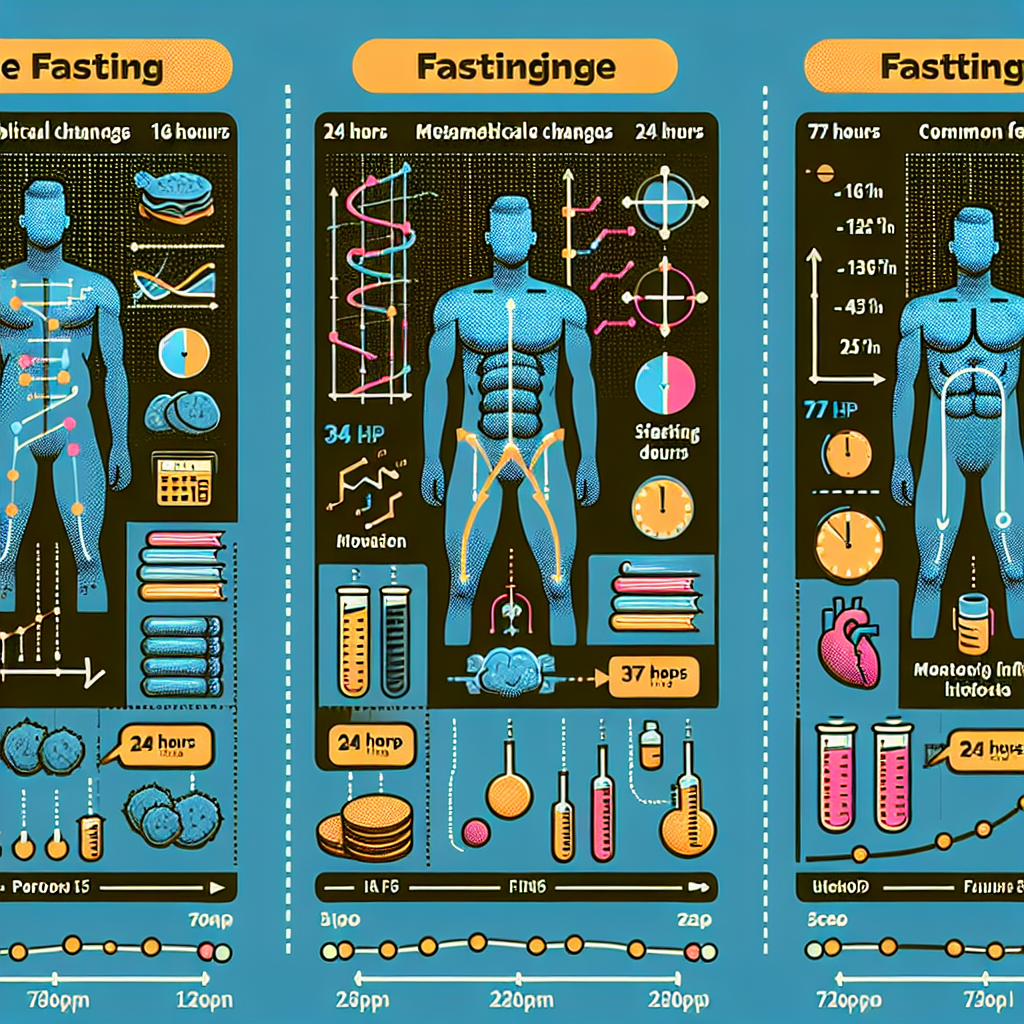The Science of Fasting Durations: 16h vs 24h vs 72h

Discover the science behind fasting durations of 16h, 24h, and 72h. Learn how different fasting periods can impact your health and wellness. Dive into the research and make informed decisions about your fasting routine. Visit My Vibrant Vitality now to start your journey.
Comparing the Effects: 16-Hour, 24-Hour, and 72-Hour Fasting Durations
The science of fasting has been a topic of interest for many years, with numerous studies conducted to understand its effects on the human body. Fasting, the voluntary abstinence from eating for a certain period, has been linked to a variety of health benefits, including weight loss, improved metabolic health, and even a longer lifespan. However, the duration of the fast can significantly impact these benefits. In this article, we will delve into the science of fasting durations, comparing the effects of 16-hour, 24-hour, and 72-hour fasts.
Starting with the 16-hour fast, also known as the 16:8 method, this involves fasting every day for 14-16 hours and restricting your daily eating window to 8-10 hours. Within this window, you can fit in two, three, or more meals. This type of fasting is popular because it is relatively easy to maintain. The primary benefit of a 16-hour fast is that it can aid in weight loss and improve metabolic health. By eating fewer meals and reducing your calorie intake, you can lose weight. Moreover, fasting for short periods helps your body to burn fat and promotes the release of growth hormones.
Transitioning to a 24-hour fast, this involves a full day of fasting. Unlike the 16-hour fast, the 24-hour fast is usually performed once or twice a week. The 24-hour fast can be quite challenging, but it offers more pronounced benefits. It not only aids in weight loss but also improves heart health by reducing blood pressure and cholesterol levels. Additionally, a 24-hour fast can enhance brain health by boosting the production of a protein called brain-derived neurotrophic factor (BDNF), which aids in the growth of nerve cells.
Lastly, let’s consider the 72-hour fast. This is a prolonged fast that should only be undertaken under medical supervision. A 72-hour fast can lead to significant weight loss, but it also puts the body into a state of ketosis, where it starts using fat as its primary energy source instead of glucose. This state of ketosis can have numerous benefits, including improved brain function, increased longevity, and protection against diseases like Alzheimer’s and cancer. However, a 72-hour fast can also have adverse effects, such as nutrient deficiencies and muscle loss, if not properly managed.
In conclusion, the science of fasting durations reveals that the benefits of fasting increase with the length of the fast. A 16-hour fast can aid in weight loss and improve metabolic health, a 24-hour fast can offer additional benefits like improved heart and brain health, and a 72-hour fast can lead to significant weight loss and potentially offer protection against various diseases. However, it’s important to note that longer fasts also come with increased risks and should only be undertaken under medical supervision. As with any health regimen, it’s crucial to listen to your body and choose the fasting duration that best suits your lifestyle and health goals.
Understanding the Science Behind Different Fasting Durations: 16h, 24h, and 72h

Fasting, the practice of abstaining from food for a specific period, has been a part of human culture for centuries. However, it is only recently that science has begun to unravel the complex physiological processes that occur during fasting and the potential health benefits that can be derived from it. In particular, the effects of different fasting durations, such as 16 hours (16h), 24 hours (24h), and 72 hours (72h), have been the subject of much scientific scrutiny.
The 16-hour fast, also known as the 16:8 method, involves fasting for 16 hours and eating within an 8-hour window. This method is popular due to its flexibility and ease of integration into daily life. Scientifically, a 16-hour fast allows the body to enter a state of ‘ketosis’, where it begins to burn fat for energy instead of glucose. This can lead to weight loss and improved metabolic health. Moreover, studies have shown that this fasting duration can enhance autophagy, a cellular cleaning process that removes damaged cells and reduces inflammation.
Transitioning to a 24-hour fast, often referred to as ‘eat-stop-eat’, involves a full day without eating. This method is more challenging but can yield more significant health benefits. After about 12 hours of fasting, the body depletes its glucose reserves and starts burning fat for energy, leading to weight loss. Additionally, a 24-hour fast can stimulate the production of human growth hormone (HGH), which aids in muscle growth and fat burning. It also promotes cellular repair and can improve heart health by reducing blood pressure and cholesterol levels.
The 72-hour fast, while less common, is often used for its potential therapeutic benefits. This extended fast pushes the body further into ketosis, leading to more significant fat loss. However, the most notable benefit of a 72-hour fast is its impact on the immune system. Research has shown that fasting for 72 hours can trigger the regeneration of the immune system, as the body starts to produce new white blood cells to replace old ones. This can potentially improve the body’s resistance to diseases and infections.
However, it’s important to note that while these fasting durations can offer numerous health benefits, they are not without risks. Extended fasting periods can lead to nutrient deficiencies, muscle loss, and other health complications if not properly managed. Therefore, it’s crucial to approach fasting with caution, and preferably under the guidance of a healthcare professional.
In conclusion, the science of fasting durations reveals a fascinating interplay between our eating patterns and our body’s physiological processes. Whether it’s a 16-hour fast that fits seamlessly into your daily routine, a 24-hour fast that pushes your body’s metabolic flexibility, or a 72-hour fast that rejuvenates your immune system, each fasting duration offers unique health benefits. However, it’s essential to remember that fasting is not a one-size-fits-all solution, and individual responses can vary. Therefore, it’s crucial to listen to your body and choose a fasting duration that aligns with your health goals and lifestyle.
The Impact of Fasting Durations on Health: A Deep Dive into 16h, 24h, and 72h Fasts
Fasting, the voluntary abstinence from food for a specific period, has been practiced for centuries for religious, spiritual, and health reasons. Recently, it has gained popularity as a weight loss and health improvement strategy. The science of fasting durations, particularly 16-hour, 24-hour, and 72-hour fasts, has been a subject of interest for many researchers.
Starting with the 16-hour fast, also known as the 16:8 intermittent fasting, it involves limiting your eating window to 8 hours and fasting for the remaining 16 hours of the day. This method is popular due to its flexibility and ease of integration into daily life. Scientifically, the 16-hour fast has been shown to promote weight loss, improve insulin sensitivity, and reduce inflammation. A study published in the journal Nutrition and Healthy Aging found that participants who followed a 16:8 fasting regimen for 12 weeks had significantly lower insulin levels and lost more weight compared to those who ate at normal meal times.
Transitioning to the 24-hour fast, or the ‘eat-stop-eat’ method, it involves a full day of fasting once or twice a week. This method is more challenging due to the longer fasting duration but offers more profound health benefits. Research published in the American Journal of Clinical Nutrition found that 24-hour fasting can significantly reduce blood pressure and cholesterol levels, contributing to cardiovascular health. Additionally, a 24-hour fast can stimulate autophagy, a cellular cleaning process that removes damaged cells and reduces the risk of chronic diseases.
Lastly, the 72-hour fast, which involves abstaining from food for three consecutive days, is the most extreme of the three. This method is not recommended for beginners or those without medical supervision due to the potential risks involved. However, the benefits of a 72-hour fast are substantial. A study in the journal Cell Stem Cell found that a 72-hour fast can reset the immune system, promoting the regeneration of new immune cells. This fast can also induce a state of ketosis, where the body burns fat for energy, leading to significant weight loss.
However, it’s important to note that while these fasting methods can offer health benefits, they are not suitable for everyone. Individuals with certain medical conditions, pregnant women, and those with a history of eating disorders should avoid fasting. Moreover, fasting should not be used as a substitute for a balanced diet and regular exercise.
In conclusion, the science of fasting durations reveals that 16-hour, 24-hour, and 72-hour fasts each offer unique health benefits. The 16-hour fast is a flexible method that promotes weight loss and improves insulin sensitivity. The 24-hour fast offers cardiovascular benefits and stimulates autophagy. The 72-hour fast, while more extreme, can reset the immune system and induce significant weight loss. However, the choice of fasting duration should be based on individual health goals, lifestyle, and medical conditions. Always consult with a healthcare professional before starting any fasting regimen.